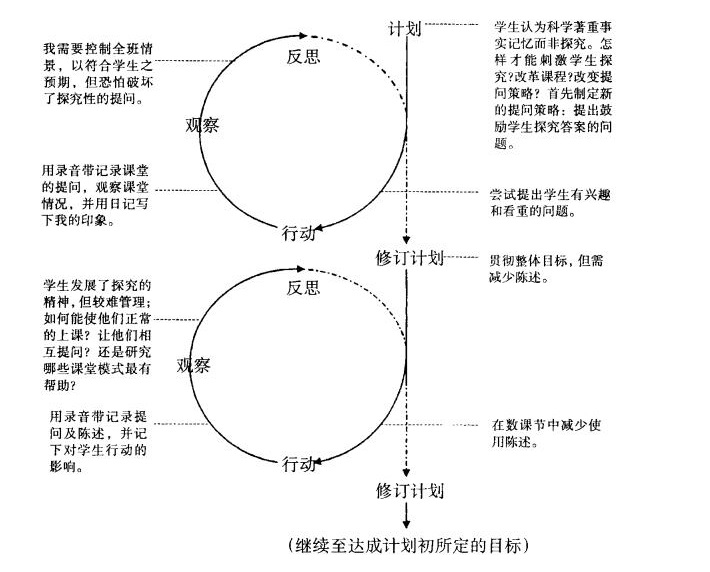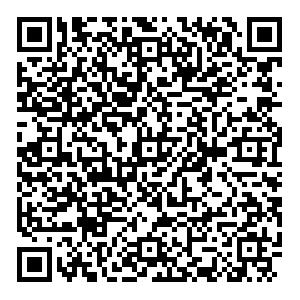-
1) ①Habermas (1972)以知识构成的趣向为基础, 建立三种知识形式的构想, 引起广泛的讨论, 亦激发不少的批评(例如, McCarthy, 1978; Keat, 1981; Thompson & Held, 1982; Bottomore, 1984, p.57-58;曾庆豹, 1996;欧力同, 1997).例如, Habermas (1972)并未明确指出“经验-分析的"科学与“历史解释的”科学这两种知识, 如何(或是否)能够在社会科学理论中趋于一致.换言之, 是否可以用实证分析知识趣向解说社会生活。2) ②许多学者质疑“解放趣向”的意义, 认为它的定义远不如其它两种趣向与知识形式的清楚(Kolakowski, 1968, pp.393-394; Botomore, 1984, p.82).而且, 在Hakemas的后期著作中, 虽未放弃其知识论, 但已作了大幅的修改.因此, Habermas在后期似乎已放弃了建构知识论的企图(Botomore, 1984, p.61).本文之重点不在批判Habermas之知识论, 而在于说明他着重解放的知识趣向, 故并不会详细说明各学者的评论。4) ④McKernan (1989)以科学(sientific).合作实践(pacica-ollaborative)及批判(eritical), 但三者的内涵与技术(technical), 实践(practical)及解放(emancipatory)相类。
-
图 1 改善教学的Deakin行动研究模式(修改自Kemmis & McTaggart, 1988)
表 1 课程定义与知识旨趣的关系.(修改自李子建, 1996, p .4)

表 2 不同知识趣向的特色

表 3 行动研究的时刻(moments) (McKernan, 1996, p.27)

-
[1] T. Aspland, Ⅰ. Macpherson, C. Proudford, & L. Whitmore(1996). Critical Collaborative Action Research as A Means ofCuriculum Inquiry and Empowerment. Educational Action Research, 4(1), PP.93-104. [2] T. Bottomore(1984). The Frankfunt School. Chichester : Ellis Horwood Itd. [3] J. Braaten(1991). Habermas's Critical Theory of Society. New York: State University of New York. [4] W. Carr, & S. Kemmis(1986). Becorming Crical : Education, Knowuldege and Action Research. London: Falmer Press. [5] w. Carr(1995). For Education : Torards Critical Educational Inquiry. Buckingham: Open University Press. [6] J. Elliott(1991). Acion Research for Educational Change. Philadelphia: Open University Press. [7] Grundy(1982). Three Modes of Action Research. Curriculum Perspectives.2(2), pp.23 - 24. [8] S. Grundy(1987). Curiculum : Product or Praxis. London: The Falmer Press. [9] J. Habermas(1987). The Philosophical Discourse of Modernity : Twelrve Lectures (F. Lawrence, Trans.)Cambridge: Polity Press. (Original work published 1986). [10] J. Habermas(1972). Knouldege and Hunan Interests(J. J. Shapiro, Trans). London: Heinemann. (original uwork pub-lished 1968). [11] D. C. Hoy(1978). The Critical Circle : Literature, History, and Philosophical Hermeneutics. Berkeley: University of Cal-iformia Press. [12] R. Keat(1981). The Politics of Social Theory : Habermas, Freud, and the Critique of Positiaism. Oxford: Blackwell. [13] S. Kemmis, & R. McTaggart(1988). The Action Research planner(3n ed.). Victoria: Deakin University. [14] W.S.Li, T.S.lam, W. M. Yu, & P.K. Fok(1998a). The End of Action Reseurch? The Case for Hong Kong. Paper pre-sented at the Intemnational Teacher Education Conference 1998(ITEC 98)in the Fast China Normnal University, Shanghai, China, Apil 26 - 30. [15] J. B. MacDonald(1975). Curriculum and Human Interests. In W Pinar(ed.), Curiculum Theorizing : The Reconceptualists. Berkeley : McCutchan Pubishing Corporation. [16] C.J. Marsh(1997). Key Concepts for Understanding Curiculumn : Volune 1. Loudon: The Falmer Press. [17] T. McCarthy(1978). The Critical Theory of Jurgen Habermas. Cambridge, Massachuet: MIT Press. [18] J. McKernan(1987). Action Research and Curiculum Development. Peabody Jounal of Education, 64(2), pp.6- 19. [19] J. McKernan(1989). Varieties of Curiculum Action Research: Constraints and Typologies in Anglo-Inish and American Projects. Paper presented at the Annual Meeting of the American Educational Research Association, San Francisco, CA March 27-31, 1989. [20] J. Mckernan(1991). Action Inquiry : Sudied Enactment. In E. C. Short(ed.), Forms of Curiculuom Inquiry(pp.309 -326). New York: State Unvrsity of New York Press. [21] J. Mckernan(1996). Curiculum Action Research : A Handbook of Mehods and Resoures for the Refletive Pratitioner(2md ed.). London: Kogan Page. [22] J. McNiff(1988). Action Research : Principles and Practice. London: Macnillan. [23] R. McTaggart, & M. Carbutcheon Singh(1986). New Directiuns in Action Research. Gurriculum Perspectires, 6(2).42- 46. [24] S. E. Noffke, & M. Brennan(1991). Sudent Teachers Use Action Research: Issues and Examples. In B. R. Tabachnick, & K.M.Zeichner(eds.), lssues and Practices in Inquiry-0riened Teacher Education(pp. 186 - 201). London: The FalmerPress. [25] P. Ricoeur(1991). From Text to Action: Essays in Herneneutics Ⅱ. UK : Athlone Press. [26] G. Ritzer(1996). Classical Sociological Theory(2nd ed.). New York: The McGraw Hill International Editions. [27] W. H. Schubert(1986). Curriculum : Perspective, Paradigm, and Pssibility. New York: Macmillan. [28] J. Schwab(1969).The practical: A language for Curiculum. School Review, 78, pp.1-23. [29] J. Schwab(1971). The Practical: Arts of Eelectie.School Rerierv, 79(4), pp.493 - 542. [30] J. Schwab(1973). The Practical 3: Translation into Curriculum. School Rerier, 81(4), pp. 501-522. [31] J. Schwab(1983). The Practical 4: Somehing for Cumiculum Profesors to Do. Curiculum Inquiry, 13(3), pp.239-265. [32] L. Stenhouse(1975). An Introduction to Curiculum Research and Development. London: Heinemann. [33] J. B.Thompson, D. Held, (ed.)(1982). Habermas, Critical Debates. London: Macmillan. [34] D. H. Tripp(1987). Action Research and Pofessional Development. ln P. Hughes, (ed.), Better Teachers for Better Schools. Melbourme: Australian College of Education. [35] A. Wellmer (1985). Reason, Utopia, and the Dialectic of Enlightenment. In R. J. Bermstein, (ed.), Habermas and Modermity(pp.35 - 66). Masachusels: The MIT Press. [36] O.Zuber-Skerritt(1996a). Introduction: New Directions in Action Rescarch. In O. Zuber Skeritt, (ed.), New Drections in Action Research(pp.3 - 9)London: The Falmer Press. [37] O.Zuber-Skerritt(1996b). Enancipatory Action Ressearch for Organisational Change and Managenent Development.In O.Zuber Skenitt, (ed.), New Directions in Action Research (pp.83-105).London: The Falmer Press. [38] 余灵灵: 《哈伯玛斯传》, 河北人民出版社, 1998. [39] 李子建: 《环境教育的取向: 课程范式之观点》, 《初等教育学报》1993年第1期. [40] 李子建: 《从批判角度剖析课程定义》, 《教育学报》1996年第1期. [41] 李子建、黄显华: 《课程: 范式、取向和设计》(第二版), 香港中文大学出版社, 1996年. [42] 李英明: 《哈伯马斯》, 台北东大图书公司, 1986年. [43] 周华山: 《试论当代社会学理论》, 李明堑(编)《社会学新论》香港: 商务印书馆, 1992年. [44] 金耀基: 《范典与社会学之发展》, 李明堑(编)《社会学新论》香港: 商务印书馆, 1992年. [45] 高宣扬: 《哈伯玛斯论》, 台北远流出版公司, 1991年. [46] 高慎英: 《教师成为研究: "教师专业化"问题探讨》, 《教育理论与实践》1998年第3期. [47] 郭官义、李黎: 《译者前言》, 哈伯玛斯著.《认识与兴趣》上海学林出版社, 1999年. [48] 陈向明: 《甚么是行动研究》, 《教育研究与实验》1999年第2期. [49] 陈伯璋: 《课程研究与教育革新》, 台北师大书苑, 1987年. [50] 陈美如: 《跃登教师研究的舞台: 教师课程行动研究初探》, 《人文及社会学会科教学通讯》1996年第1期. [51] 陈惠邦: 《教育行动研究》, 台北师大书苑, 1998年. [52] 曾庆豹: 《当代西方著名哲学家评传: 社会哲学》, 山东人民出版社, 1996年. [53] 黄政杰: 《课程改革》(二版), 台北汉文, 1992年. [54] 黄瑞祺: 《批判社会学: 批判理论与现代社会学》, 台北三民书局, 1996年. [55] 杨深坑: 《教育知识的国际化或本土化?一兼论台湾近年来的教育研究》.《教育学报》1996年第1期. [56] 欧力同: 《哈贝马斯的批判理论》重庆出版社, 1997年. [57] 欧用生: 《教师专业成长》, 台北师大书苑有限公司, 1996年. [58] 蔡清田: (行动研究理论与"教师即研究者"取向的课程发展》, 载台东师院国民教育研究所(编)《行动研究国际学术研讨会论文集》, 1998年. -






 下载:
下载:
